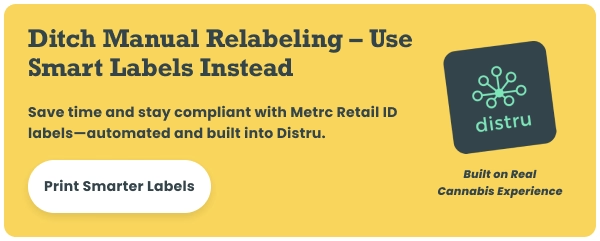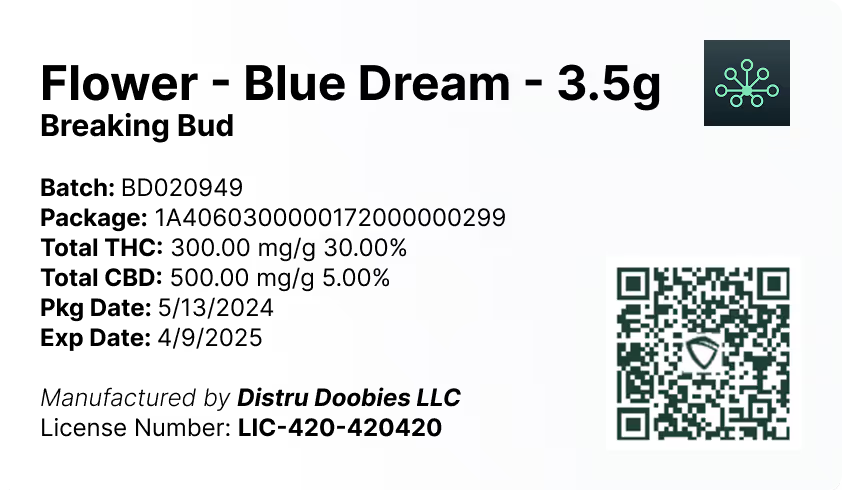.png)
After months of regulatory uncertainty, New York cannabis operators now have definitive guidance on compliance requirements following the state's transition to Metrc for seed-to-sale tracking. Metrc currently operates in 30 regulated markets nationwide and provides comprehensive support resources to ensure a smooth implementation.
New York's Office of Cannabis Management (OCM) initially planned to implement BioTrack as the state's track-and-trace system, with rollout scheduled for August 2025. Some operators had already begun integration when unexpected developments altered the landscape.
Shortly after the initial August rollout, BioTrack and Metrc reached an agreement whereby Metrc assumed BioTrack's government contracts. This development prompted OCM to pause implementation while evaluating the path forward.
Following a comprehensive review in August, OCM determined that transitioning to Metrc would better serve New York's cannabis market. The agency cited the "best interest" of the state's cannabis industry as the primary factor in this decision.
As of early 2026, Metrc serves as the official seed-to-sale tracking system for all New York cannabis license holders. This universal implementation ensures consistent compliance standards across the state's entire regulated cannabis industry.
.avif)
What Are the Current Cannabis Compliance Regulations in New York?
The Office of Cannabis Management OCM runs the show for New York cannabis compliance. They're the ones setting the rules, doing the inspections, and handing out penalties when things go wrong.
OCM's approach is straightforward: they want to know where every gram of cannabis is at all times. That means real-time tracking for everything from the moment you tag a plant until someone buys it at a dispensary.
The main areas you need to worry about are tracking every piece of inventory in real time, keeping detailed security and recordkeeping that regulators can review whenever they want, making sure all your products meet safety standards with proper lab testing and labeling, and following Good Manufacturing Practices if you're processing anything.
OCM's Enforcement Division doesn't mess around. They do both scheduled and surprise inspections, and they've got a new Trade Practices Bureau that uses data analytics to spot potential problems. They're not just checking boxes during visits anymore. They're actively looking for patterns that might indicate violations.
New York Metrc Implementation Timeline
The transition to Metrc followed a structured timeline to ensure all operators could onboard smoothly:
- October 22, 2024: Metrc Connect API and testing endpoints became available for third-party integrators
- October 23: Testing facilities webinar conducted
- October 29: Third-party integrator webinar held
- October 31: Credentialing began for testing facilities
- November 3-7: In-person roadshows across New York
- November 7: Metrc credentialing opened for all license types; UID tag orders began
- November 10: Physical Metrc tags with UIDs shipped to operators; virtual testing samples created for existing inventory
- November 14: Beginning inventory process started
- November 21: Business setup deadline (all required admin info in Metrc)
- December 5: Testing facilities uploaded results for previously tested products
- December 8-12: Licensee check-in webinars
- December 15: All inventory tagged in Metrc
- December 17: All licensees operational in the system
.avif)
New York's Seed-to-Sale Tracking: Metrc Integration Requirements
Metrc stands for Marijuana Enforcement Tracking Reporting Compliance, and it's designed specifically for government oversight. It exists to give regulators a real-time window into what's happening across the entire cannabis supply chain.
Metrc is a trusted partner to 30 regulated markets nationwide, providing reliable, secure, and user-friendly solutions for track-and-trace compliance.
Every cannabis business has specific things they need to track in Metrc:
If you're a cultivator, you need to tag individual plants once they hit the vegetative stage. Before that, you can track batches of up to 100 seedlings or clones under one tag. Every time you move plants between rooms, change their growth phase, or harvest them, that goes into Metrc within a few days.
Processors and manufacturers have to log every production batch, track how raw materials get turned into finished products, and make sure lab test results are linked to the right inventory. Every new package you create for sale gets its own unique Metrc tag.

If you're handling distribution, you're responsible for generating transport manifests in Metrc for every single shipment between licensed facilities. The manifest has to include details about where the cannabis is coming from, where it's going, who's driving, what vehicle they're using, and every single package in the shipment.
Retailers log all incoming inventory, record every sale, and keep their stock levels updated in real time. You also need to reconcile your sales data with Metrc records every day.
Testing labs upload results directly into Metrc and link them to the specific batches they tested. Products can't move to retail until those test results are in the system and show everything passed.
One thing New York adopted is called Metrc Retail ID. These are dynamic QR codes that go on retail packages. When someone scans them, they can see verified info about that exact product like who grew it, what batch it came from, and what the lab results showed.
Getting Started with Metrc in New York
Setting up your Metrc account is straightforward but requires following specific steps in order:
Step 1: Register for Metrc Learn TrainingAll new users must create an account in Metrc Learn and complete the New Business Training course. This training is mandatory before you can receive system credentials.
Step 2: Complete Your Training AssessmentOnce you pass the New Business Training assessment, your information is automatically sent to Metrc Support for credential processing.
Step 3: Receive Your Login CredentialsYou'll receive an email from Metrc containing your user credentials for the system. This typically happens within a few business days of completing training.
Step 4: Validate Your AccountLog into Metrc within 72 hours of receiving your welcome email to activate your account and begin system setup.
Step 5: Continue Advanced TrainingAccess Metrc Learn for license-specific advanced training courses that cover your particular operation type (cultivation, processing, retail, etc.).

Pricing and Tagging Details
The switch to Metrc isn't going to cost you more than BioTrack would have. Each unique identifier tag costs $0.10, which is exactly what BioTrack was charging. And Metrc provides the actual physical tags at no extra cost beyond that ten cents.
If you already bought BioTrack tags before the switch happened, you're not completely screwed. Metrc will issue credits for any unused BioTrack UIDs you purchased. So if you bought 1,000 BioTrack tags that you never used, you'll get 1,000 Metrc tags at no charge.
For software companies building integrations, Metrc won't charge them fees to connect to the API. This means your third-party software provider won't face new financial barriers to support Metrc.

Enforcement Measures by the Office of Cannabis Management
Understanding New York cannabis compliance enforcement is crucial because OCM's approach is pretty straightforward. They do scheduled inspections and surprise visits to make sure your physical inventory matches what's in Metrc.
If they find discrepancies during an audit, you're looking at potential violations. They've defined specific thresholds for what counts as a "significant discrepancy." For cultivators, if your physical inventory doesn't match Metrc by more than 2%, that triggers mandatory reporting and possibly an investigation.
The penalties aren't jokes either. OCM has already handed out fines over $50,000 for serious violations.
But here's what really gets operators in trouble: if you're not using Metrc properly, you can get locked out of the supply chain. If a dispensary doesn't have their Metrc integration working, distributors literally can't deliver products to them because all transfers have to happen through the system.
Transport violations are especially risky. If you're moving cannabis without a proper Metrc manifest, enforcement can seize it as an unlicensed product.
Product Safety Standards for Cannabis in New York
New York cannabis compliance requires comprehensive testing for everything that hits retail shelves. The way this works with Metrc is pretty elegant: products literally cannot move to retailers until lab results are uploaded into the system and linked to the right inventory.
This prevents a lot of sketchy behavior. Labs have to upload results directly into Metrc, so there's no opportunity for operators to shop around for better results or fudge the numbers.
Good Manufacturing Practices are required for anyone doing processing. This covers everything from how clean your facility is to how you document your production processes. OCM will actually verify that you're following them during inspections.
.avif)
Ensuring Compliance with New York Laws
Training is everything. This is where most New York cannabis compliance failures start. Every person who touches cannabis inventory needs to understand how to use Metrc properly. Metrc provides comprehensive training through Metrc Learn, with over 300 courses covering New Business Training, Advanced Training by license type (Cultivation, Manufacturing, Retailer, Testing, Distributor), and ongoing learning journeys. All training is available 24/7 and includes interactive practice environments where you can test workflows before implementing them in production.
Build solid standard operating procedures for everything Metrc-related. How do you tag plants? How do you record harvests? How do you create packages? How do you generate manifests? If these processes aren't documented and consistent, you're asking for trouble.
Do regular internal audits. The state requires monthly inventory reconciliation and annual comprehensive audits, but smart operators do their own checks more frequently.
Get your software integration sorted out early. Most successful cannabis businesses use third-party software that connects to Metrc rather than trying to do everything manually through the web interface. This reduces errors and saves time on daily compliance tasks.
Have a plan for when Metrc goes down. Because it will. Keep paper forms ready for manifests and inventory logs. Know the procedure for getting OCM approval if you need to do transfers during an extended outage.
The key thing to remember is that New York cannabis compliance becomes part of your daily operations. Every plant movement, every package creation, every sale has to be logged properly and on time.
Current Issues and Challenges in New York Cannabis Compliance
Beyond the Metrc transition, New York operators are dealing with some specific challenges that have caught people off guard.
Zoning and proximity issues have been huge. Several dispensaries have gotten in serious trouble for opening in locations that violated distance requirements from schools or other sensitive areas. Perfect Metrc compliance won't save you if you're operating in the wrong location.
The technology adaptation has been bumpy for some operators. Businesses that chose integration partners with actual Metrc experience generally had smoother transitions. But some operators went with cheaper options or tried to build integrations themselves and ran into problems.
Advanced features like Metrc Retail ID provide competitive advantages for retailers who implement them effectively. The dynamic QR code system enhances product authentication and builds consumer trust while meeting transparency requirements.
.avif)
Distru is Ready for Metrc New York
Now that you understand Metrc's capabilities and support resources, choosing the right integration partner is critical for operational success. While Metrc provides the compliance infrastructure, third-party software like Distru handles your day-to-day business operations and ensures seamless data flow to Metrc.
While a lot of compliance software companies are still figuring out how to work with Metrc properly, we've been perfecting the integration for almost ten years. We work with cannabis operators in 29+ Metrc states and support over 500,000 users. So when New York operators need help with compliance, we're not learning on the job.
This experience matters more than you might think. Metrc has quirks and state-specific configurations that can trip up inexperienced integrators. We've helped businesses through similar transitions in states like Illinois and Michigan.
Metrc Retail ID integration is something we got working while other software companies are still catching up. Our platform automatically generates and prints those dynamic QR codes for retail packages.
Automatic data syncing means you're not entering the same information twice. When you create packages or record sales in Distru, we push that data to Metrc automatically.

Offline continuity keeps you working even when Metrc goes down. You can keep fulfilling orders and managing inventory in Distru, and everything syncs back to Metrc when the system comes back online.
Manifest generation turns a painful manual process into a few clicks. Instead of typing driver details, vehicle info, and package lists into Metrc for every shipment, Distru pulls the data from your existing orders and generates compliant manifests automatically.
Our support team includes people who understand both Metrc requirements and New York cannabis compliance regulations.
What This Means for Your Cannabis Business
New York cannabis compliance centers on Metrc integration as the foundation for regulatory oversight. Every licensed operator needs to understand proper seed-to-sale tracking, maintain accurate inventory records, and follow established protocols for transport, testing, and retail sales.
The key to successful compliance is proper training, solid standard operating procedures, and reliable technology integration. Operators who invest in comprehensive Metrc training and experienced integration partners position themselves for long-term success.
Enforcement consequences for New York cannabis compliance failures can be severe, ranging from significant fines to license revocation. But operators who maintain proper Metrc integration and follow established best practices can focus on growing their businesses within New York's legal framework.
.avif)
Ready to Ensure Your Metrc Compliance?
Distru's nearly decade-long Metrc integration experience can help your New York cannabis operation maintain seamless compliance while focusing on business growth. Our platform automates complex tracking requirements, generates accurate manifests, and provides advanced features like Metrc Retail ID.
Book a demo today to see how Distru's proven Metrc integration can simplify your compliance workload and protect your cannabis license.










